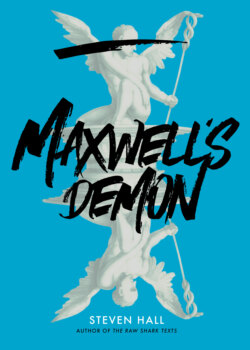Читать книгу Maxwell's Demon - Steven Hall - Страница 15
На сайте Литреса книга снята с продажи.
Оглавление7
The Letter
Cleaning the kitchen in a kind of trance, entirely absorbed in the act of ordering and restoring, I took a deep satisfaction in matching up the plates, cups and pans, and in vanishing each set behind cupboard doors and drawer fronts. I’d just finished mopping the floor and was pouring grey water into the toilet bowl when there was a knock on the front door.
Danni Grayson from the flat upstairs stood in the doorway, her arms full of post, all of it for me and for Imogen, and all of it delivered to her flat by mistake at various times over the last three weeks. Her expression said they have one job and for God’s sake, and mine said sorry and tell me about it. The problem had been going on for so long that we didn’t need to discuss it.
I took the pile through to the kitchen and began to sort it. Junk mail, red bill, junk mail, junk mail, red bill, red bill, junk mail, bank statement, red bill, red bill, red bill. And then—
‘Oh.’
The word came involuntarily, as my chest squeezed itself tight in surprise.
I stood dead still, the red bill in my hand still hovering above its pile on the counter.
A small, simple, handwritten envelope had emerged from the mass-produced, plastic-windowed heap. My name and address appeared in small, neat black capitals, and the whole thing was finished off with a perfectly aligned first-class stamp.
I knew the letter was from Andrew Black the moment I saw it.
‘Oh,’ I said, for a second time.
I thought I’d never see that neat black writing again.
The story was a fairly famous one. I knew it as well as anyone, probably better than most:
Six years ago, Andrew Black abandoned his writing career, Cupid’s Engine, and everything else. He released one massive bestseller, and then he vanished. Even the few people who knew him, who had worked with him on his novel, never heard from him again. If you’d pushed me for a reason as to why he’d do such a thing, I might’ve told you that certain circumstances led to this decision, prompting him to sever whatever ties he had with the world, and his literary ties especially, but none of those things were down to me. I’d have said we were acquaintances – friends would be too much of a stretch – for a while after my father died, but even so, I assumed – I assumed that I’d hear something from him when things finally settled down. Or, at least, I assumed that somebody would hear something. But, as far as I knew, no one ever had.
Not until that moment.
I turned the envelope over in my hands.
The postmark told me that the letter had been sent weeks earlier. I ripped it open, feeling a stab of anxiety. Small talk, pleasantries, just saying hello – that wasn’t Andrew Black. This meant that something was happening, or had happened, and I was only hearing about it now.
Inside, I found a single Polaroid picture and a small folded note.
The photograph showed a black sphere, resting on what I took to be Andrew’s desk. He’d placed a ruler next to the object, and though the Polaroid was a little fuzzy, it seemed to indicate a diameter of around ten centimetres. I struggled to make out much more, partly because it was slightly blurred, but also because the sphere was so utterly black. The most diffuse crescent moon of light touching the thing’s left side, and an equally faint shadow on the bench to its right, were all that gave it away as three-dimensional.
The object – whatever it was – looked as black as a hole.
And it bothered me.
I don’t write that lightly. I’ve thought long and hard about whether to include my reaction here at all, but the facts are the facts. I didn’t like the picture when I first saw it. As to whether we should set any store by this, whether it means anything – that’s another matter altogether.
I put down the Polaroid and unfolded Andrew’s note.
Only nine words, each one written in that same precise hand:
Thomas,
What do you think this is?
Andrew Black
